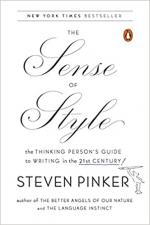
I am a psycholinguist and a cognitive scientist, and what is style, after all, but the effective use of words to engage the human mind? It’s all the more captivating to someone who seeks to explain these fields to a wide readership. I like to read style manuals for another reason, the one that sends botanists to the garden and chemists to the kitchen: it’s a practical application of our science. Here is the great essayist reminiscing about his teacher: Lucas, George Orwell, William Safire, and of course White himself, the beloved author of Charlotte’s Web and Stuart Little. White turned into their famous little book, was studded with gems of self-exemplification such as “Write with nouns and verbs,” “Put the emphatic words of a sentence at the end,” and best of all, his prime directive, “Omit needless words.” Many eminent stylists have applied their gifts to explaining the art, including Kingsley Amis, Jacques Barzun, Ambrose Bierce, Bill Bryson, Robert Graves, Tracy Kidder, Stephen King, Elmore Leonard, F. William Strunk’s course notes on writing, which his student E. It’s also that credible guidance on writing must itself be well written, and the best of the manuals are paragons of their own advice. It’s not just that I welcome advice on the lifelong challenge of perfecting the craft of writing. Ever since I was assigned Strunk and White’s The Elements of Style in an introductory psychology course, the writing guide has been among my favorite literary genres. "synopsis" may belong to another edition of this title. He replaces dogma about usage with reason and evidence, allowing writers and editors to apply the guidelines judiciously, rather than robotically, being mindful of what they are designed to accomplish.įilled with examples of great and gruesome prose, Pinker shows us how the art of writing can be a form of pleasurable mastery and a fascinating intellectual topic in its own right.

In this short, cheerful, and eminently practical book, Pinker shows how writing depends on imagination, empathy, coherence, grammatical knowhow, and an ability to savor and reverse engineer the good prose of others. Instead, he applies insights from the sciences of language and mind to the challenge of crafting clear, coherent, and stylish prose.

Rethinking the usage guide for the twenty-first century, Pinker doesn’t carp about the decline of language or recycle pet peeves from the rulebooks of a century ago. In The Sense of Style, the bestselling linguist and cognitive scientist Steven Pinker answers these questions and more. Why is so much writing so bad, and how can we make it better? Is the English language being corrupted by texting and social media? Do the kids today even care about good writing? Why should any of us care? From the author of Enlightenment Now, a short and entertaining book on the modern art of writing well by New York Times bestselling author Steven Pinker.


 0 kommentar(er)
0 kommentar(er)
